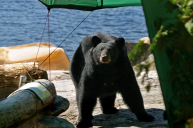While on a hike, you will see many incredible things. Typically, it is stunning views; however, you will also often get the chance to see wildlife. While things like squirrels and deer are more common, there is always the chance you could encounter something more deadly. One such animal would be the bear. If you are not prepared to see a bear, it can be terrifying, yet panicking will get you nowhere. Instead, you should always be armed with knowledge and be as well-prepared as you can to encounter these enormous creatures. Luckily, an expert is sharing his tips on the best ways to avoid bear encounters while hiking.
Expert Shares His Tips On The Best Ways To Avoid Bear Encounters

Shutterstock Photo
Wes Siler from Outside Magazine shared his tips on how to avoid bear encounters while hiking. In a tell-all video, he argues that these tips are backed by science. Additionally, he argues they have proven more effective than using bear spray. While you cannot eradicate the possibility of running into a grizzly bear completely while in nature, there are things you can do to lessen your chances dramatically. Or if you do run into one, how to avoid conflict with this apex predator.
The first suggestion that this expert offers is to "opt out." He clarifies that there are plenty of places and trails that are not home to grizzly bears. One of the best ways to avoid bear encounters is to steer clear of where the bears are known to frequent, which makes sense to me. The expert admits that you can choose to go where grizzly bears are frequently found, but then you need to be vigilant. When he doesn't want to be considered for his safety and just wants to "chill out," he will visit a place that doesn't have grizzly bears.
Next on his list of best ways to avoid bear encounters is this piece of advice: buddy up. Siler argues that Tom Smith, a leading bear biologist, strongly supports and suggests this piece of advice. Smith reported that he has never seen an incident where "two adult humans have remained tightly grouped, where a grizzly has charged and actually made contact with those humans." Meaning that if you are with a hiking buddy, you dramatically lessen the chances that a grizzly bear will attack you.
Bears Are More Scared Of You Than You Are Of Them

Shutterstock Image
His third piece of advice reminded people that grizzly bears "wan't nothing to do with humans." Therefore, if you warn them of your presence and are loud, they will most likely leave you alone. He built on that piece of advice by warning against using bear bells. While they are marketed to alert bears to your presence, Siler argues that scientists advise against them. Mainly because the bell sounds like picos, which is a prey that bears eat. The last thing you want to do while hiking in the woods is have a bear confuse you as prey. Instead, he suggests "make human sounds" such as talking with friends or signing.
Next on his tips to avoid bear encounters, he states, "consider and work with a bear's senses." He mentions that bears have an incredible sense of smell, pretty good hearing, and decent eyesight. However, many things in nature can disrupt those senses. If the wind is blowing on your face, then it is likely not blowing your scent towards the bear. Similarly, if you are near running water, the bear is less likely to hear you. Finally, things like dense brush can also restrict its view of you. If you want the bear to avoid you, try to limit your visits to places where it wouldn't know you are there. Additionally, he argues you should give the bear a chance to be alerted to your presence by giving a quick shout or throwing some rocks into the area you will be hiking.
Know What Bears Like

David Maki Photography/Shutterstock
Another piece of advice to avoid bear encounters is to limit the food smells on or around yourself. Siler argued that "Grizzly bears are attracted by the same stuff any other bear is, nice smelling food." He advises that you cook your food far from where you are sleeping. Additionally, store it far from where you sleep and in bear-proof containers. Finally, his last piece of advice seems obvious, but he still felt the need to say it...don't seek the bears out.
Shocking, I know. When thinking of bears, I don't know anyone who would purposely seek them out, but then again, people don't seem to respect or fear wildlife the same way that they used to. He even points out how videos from Yellowstone appear every year with some foolish tourist getting too close to bears and other wildlife. The expert states, "Bears are dangerous; do not intentionally recreate around them." So there you have it, six quick tips on how to best avoid bear encounters, or bear conflicts, while out in the wilderness.




